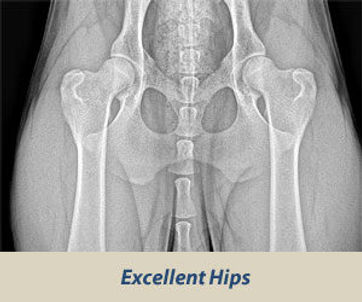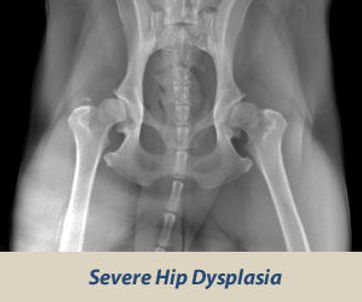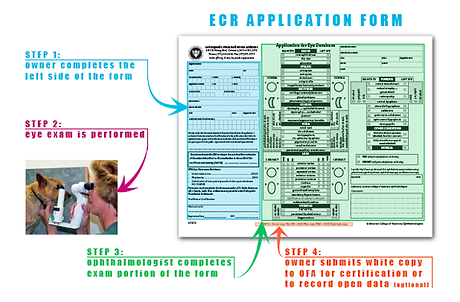
What is Health Testing?
Whether you’re buying for the show ring or to serve as a companion, health screenings are among the key factors potential owners should consider before choosing a puppy.
Increasingly, breeders are turning to health testing to ensure they are doing all they can to create strong matches between dogs that result in healthier puppies.
The Canine Health Information Center (CHIC) is a health database sponsored by the Orthopedic Foundation for Animals (OFA). The OFA created the CHIC by partnering with parent clubs with the purpose of gathering information on health issues that arise in specific breeds. Standardized health screenings for these common issues were established to help breeders to recognize the best matches for their breeding stock.
What Is Tested?
Parent clubs for many AKC recognized breeds are involved in the CHIC Certification program. These clubs have a list of recommended health screenings to check for breed-specific health concerns. One breed club may have different testing requirements than the next. Some tests are based on phenotypic evaluations, while others are based on genetic testing. The parent clubs help to establish what screenings are necessary for their breeds before entering the CHIC program. Parent clubs also determine health screening protocols such as who must perform each screening: a general practitioner, a specialist, etc.
How It Works
Dogs are screened by a veterinarian who submits results to the OFA. The OFA reviews the tests, and all results certified as “NORMAL” are automatically stored in the CHIC database and considered a part of public record. All “ABNORMAL” results can be added to the public database or not, based on the owner’s preference.
A CHIC number is issued when test results that satisfy the parent club’s requirements for testing are entered in the database. The number simply means that the dog has had all the health testing required for that breed but does not guarantee the results. If the dog has met all required testing and the owner has allowed the results to be publicly listed in the database, the dog will receive CHIC Certification.
Why Health Test?
Health testing can help everyone from breeders to buyers to researchers. Breeders can use the database to analyze pedigrees and create matches between dogs that show more health strengths than weaknesses. Puppy buyers can know they are looking at puppies that have a reduced chance of inheriting breed-specific health problems when the parents show favorable health screening results.
The CHIC uses the data to work with parent clubs in monitoring which health issues are more prevalent in their breed and measuring the progress of the breeders in reducing health concerns. This information can also help to direct researchers into studying the most prominent canine diseases and health issues.
Is My Breed Included?
Not all breeds are included in the CHIC program. Find the list of breeds with health screening recommendations at the OFA website. If your breed isn’t a part of the CHIC program, contact your parent club for additional information on health concerns.
What Do Puppy Buyers Want to See?
While some puppy buyers may only ask for health records to prove the puppy has seen a veterinarian and received a clean bill of health, many others will want to see the health screening results from the sire and dam. Puppy buyers are more informed than ever and understand the importance of a breeder who health tests and carefully matches dogs to improve their breed.
https://www.akc.org/expert-advice/dog-breeds/health-testing-for-a-stronger-breed/
What is Canine Hip Dysplasia?
Canine Hip Dysplasia typically develops because of an abnormally developed hip joint, but can also be caused by cartilage damage from a traumatic fracture.With cartilage damage or a hip joint that isn’t formed properly, over time the existing cartilage will lose its thickness and elasticity. This breakdown of the cartilage will eventually result in pain with any joint movement.
No one can predict when or even if a dysplastic dog will start showing clinical signs of lameness due to pain. The severity of the disease can be affected by environmental factors, such as caloric intake or level of exercise. There are a number of dysplastic dogs with severe arthritis that run, jump, and play as if nothing is wrong and some dogs with barely any arthritic x-ray evidence that are severely lame. Screenings for Hip Dysplasia are performed by a veterinarian with x-rays sent to OFA for grading and certification.Click here for details on
to learn more about how the OFA handles those screenings.




Eye Disease Testing
The purpose of the OFA Companion Animal Eye Registry (CAER) is to provide breeders with information regarding canine eye diseases so that they may make informed breeding decisions in an effort to produce healthier dogs. CAER certifications will be performed by board certified (ACVO) veterinary ophthalmologists. Regardless of whether owners submit their CAER exam forms to the OFA for “certification,” all CAER exam data is collected for aggregate statistical purposes to provide information on trends in eye disease and breed susceptibility. Clinicians and students of ophthalmology as well as interested breed clubs, individual breeders and owners of specific breeds will find this useful.
Genetic diseases are those that are passed on from parent to offspring through genes that carry the codes for each specific trait. Many of the diseases and disorders that affect the eyes have genetic factors.


